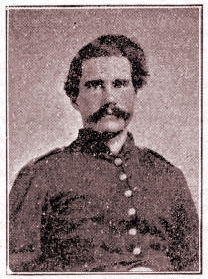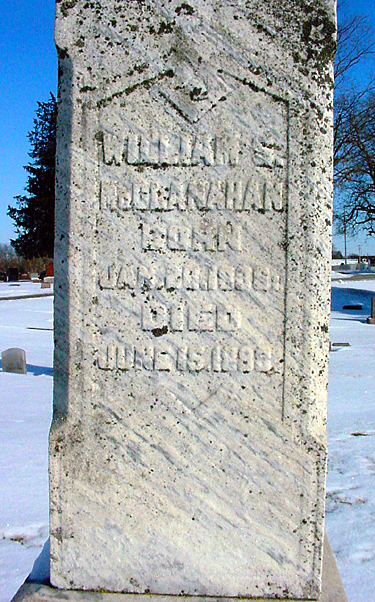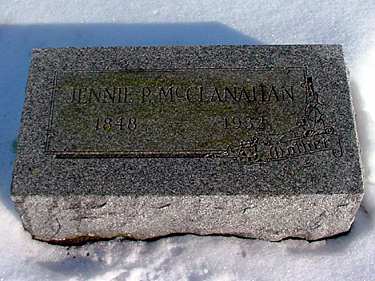
(1836-1888)



|
|
Captain William Steele McClanahan (1836-1888) |

|

|
| Viola Cemetery, Viola, Illinois |
The family funster of Ripley days had had some sobering experiences since joining the army with Monmouth's first company. His captain, "One Moore," said of his impetuous lieutenant, William Steele McClanahan, "He bore a leading part in the front lines of Fredericktown, Missouri, Shiloh, Corinth, and Vicksburg; and in the meantime, seldom missed one of the many marches and skirmishes that occurred almost daily."
"While I had charge of the right wing of the regiment, he led the company deployed with the regiment as skirmishers in the fearful charge on Vicksburg, May 22, 1863. And amid all those scenes of danger and bloody strife, he bore the part of a true hero, inspiring all around him to deeds of noblest daring."
"While driving the enemy from the battlefield of Shiloh on the second day, our regiment had advanced so far beyond the rest of our lines that we were ordered to halt, and Mac, either failing to hear the order, or in his enthusiasm determined to press the enemy to the wall, had charged out two or three rods ahead of the line, single-handed and alone, till I had to send a comrade to bring him back."
While these boys were besieging Corinth after the Battle of Shiloh, they suffered horribly from scurvy. There were no lemons nor oranges on grocery shelves at that date, indeed, any knowledge of vitamins. But something had been learned about the deficiency diseases.
Chaplain Bigger helped to care for the poor fellows, hollow-eyed and weak from scurvy. He himself was from Monmouth, a fellow Scotsman, later pastor at Sunbeam and at Akedo. He was distressed. He decided something more must be done.
The Monmouth "Oracle" takes up the story:
Monmouth College Oracle
Volume 15, no. 34 pg. 31
May 30, 1911"Something must be done, Surgeon, to save our boys," he said one evening while in the surgeon's tent. "What will do it? You ought to know."
Onions and pickles, Chaplin, will put them to the good," responded Kendall, blowing a great mouthful of smoke toward the tent-pole. "But we have neither onions nor pickles."
Quick as a flash came the answer. "We'll get them, Doctor Kendall, and I want you to help me get a leave of absence. I'll get the onions and the pickles."
Without a moment's delay an application was prepared and approved that night by the regimental commanding officer. The next morning, brigade, division and corps headquarters were visited by the Surgeon and Chaplin, and in the afternoon Chaplain Bigger was on his way home.
Arriving at Quincy, he caused his mission to be made known through the Quincy papers, describing the condition of the soldiers, and stating that he would carry all the onions, pickles, potatoes and such anti-scorbutics to the soldiers that would be sent to the Quincy dock on a certain date. The result was overwhelming. Seventeen and one-half tons had been shipped to his address and awaited removal south.
Nothing daunted, he decided to take it all. Without much difficulty he got an order from the War Department for preferred transportation. The cargo was on its way by the first boat to St. Louis, then hurried on to the suffering lads in the south.
The boys way down in Mississippi had heard all this from their home folks, and what a surprise awaited their chaplain upon his return. Every able-bodied man off duty had hiked out to the woods. Trees were cut down, clapboards split out, and when the chaplain arrived, he stood in his own pulpit in a tabernacle his boys had built him.